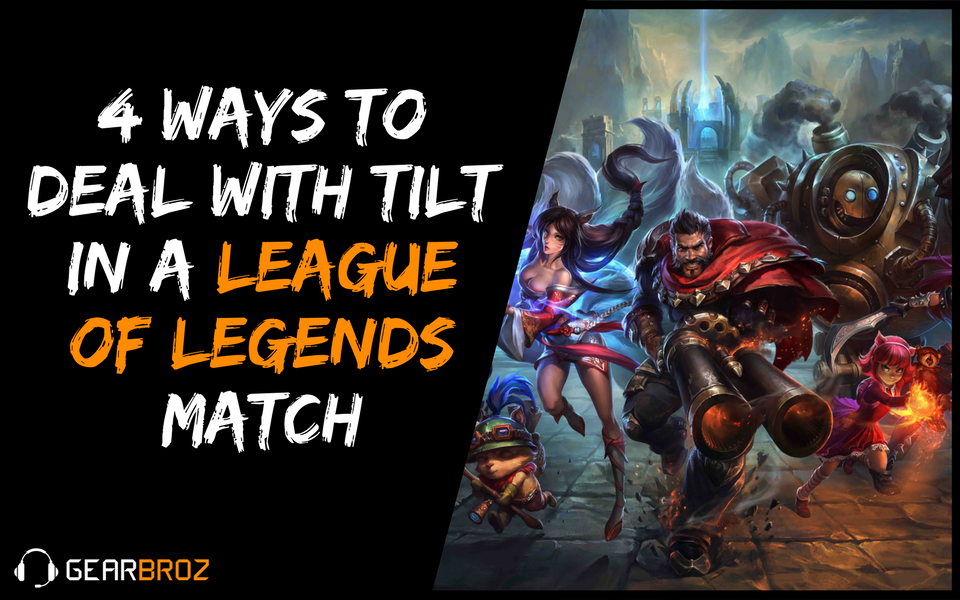Contents
What is “Tilt”?
If you don’t know what the term means, you may have felt it before. You know that feeling of dread when your team immediately gives up First Blood? Or when you fail a Flash over a wall that you usually land perfectly? You may get frustrated, angry, and become fixated on that unfavorable event. Well, that’s tilt!
Tilt refers to an emotional or mental imbalance that negatively affects your play.
It can occur for a number of different reasons and we’ll be covering them in this article. Although it’s ideal to take steps to prevent tilt before it happens, the goal of this article is to equip you with methods to deal with it when it’s occurring during your match.
Why you Should Avoid Tilt
Before we get to the methods, it’s important to understand why it’s important to avoid tilt. League of Legends is incredibly dynamic and unpredictable – with hundreds of champions, thousands of build path combinations, and regular patches that shake up the game, you’re in a constant state of strategizing and adapting your play to best tackle different situations.
In a vacuum, it’s already a daunting task to continually improve in these conditions. If you’re prone to tilting, however, the road is much tougher because you’re introducing additional variables that can hinder your performance.
Tilt makes it incredibly difficult to make the right decisions and stay consistent mechanically. For example, that First Blood you gave up may make you tunnel-vision on getting that sweet revenge kill to make up for it. As a result, you pushed up aggressively without warding and set yourself up for an easy gank and another death. That Flash over the wall you missed may decrease your confidence and make you play too passive or scared, causing you to lose CS and fall behind in lane.
If these sort of feelings don’t ring a bell, congrats! You may already have some awesome mental fortitude that keeps you steady. If these situations struck a nerve or two, you should definitely stick around!
4 Ways to Reduce Tilt During your Match
1. Acknowledge that you’re tilted

The first step to un-tilting is to accept that you are titled. After all, you can’t fix something that you don’t accept exists. To begin, mentally take note of what may be tilting you:
- Is it a teammate?
- Did they give up First Blood?
- Did they die to a gank that you pinged?
- Are they flaming you?
- Is it something the enemy team did?
- Did you get counter-picked in draft?
- Are you getting destroyed in lane?
- Is your opponent flashing emotes after your mistakes?
- Common symptoms (if you can’t specify what’s making you titled, you can still identify that you are)
- Your blood starts boiling, you feel yourself getting angry
- You start to feel like the game is unwinnable
- You want the game to end already
- You start to feel like the game is unfair
- Your champ or allies feel weak
- The enemy players and champions feel OP
These things will understandably feel bad, but do not lose hope. You’ve already on your way to getting your game back on track. Take a deep breath and consider the following options in numbers 2, 3, and 4.
2. Mute the problematic players (or everyone)

Muting problematic players is one of the quickest ways to cut out the source of your tilt. If you’re prone to getting tilted by chat in general, you may want to just outright start the game with it muted. After all, you can still communicate a good amount of things with pings and you can keep your focus on the minimap.
An effective thought exercise recommended by our analyst is to pretend that the muted players in your game are bots. What do we mean by this? No matter what you say to a bot, it’s not going to change what they do. If a bot is feeding, you shouldn’t get mad at it, it’s a bot. It seems like a funny suggestion but the whole point is to simply focus on your play and what’s within your control.
3. Look for positives to raise your morale

If you fall a little behind, it’s not the end of the world – you can still win! Instead of dwelling on everything that may be going wrong, look to un-tilt by rallying behind the things that are going right.
As we mentioned earlier, League is incredibly dynamic. It has tons of ups and downs and teams make mistakes all the time. Sure, your team may have made some big mistakes first, but that doesn’t mean that the enemy team won’t throw later. If you surrender now, you’re preventing that chance from happening.
For example, a common titler is when your team gives up First Blood or First Turret.This obviously isn’t an ideal scenario but have you considered that the enemy team drafted a team comp that excels in the early game? It’s what they’re supposed to be good at. Your team’s champions will eventually outscale your foes and be able to destroy them later in the game. Use this to encourage yourself and stay the course.
4. Focus on what you need to do next

Sometimes the best thing you can do is focus on what you need to do next. Don’t get frustrated by the last CS you missed, you’ll hit the next one. You may have died to a gank early, but it’s alright, you’ll remember to ward when you’re back in lane.
Here’s a suggested technique by our analyst:
“My advice would be write down your short-term goal, whether it’s on a death or Recall when you’re tilting. Close your eyes, take a deep breath, and look at what you wrote down for your short-term goal. You’ll need to practice it but you’ll have to deal with tilt when it comes and when it happens you’ll have to find your own personal reset button.”
Closing Thoughts
Thanks for the read! It was a ton of fun to write. If you’d like to track your tilt and how it relates to your consistency, Mobalytics has a unique analysis score that measures if bad games tend to negatively affect your following performances. It’s a great way to improve your mental resilience in combination with the techniques we covered in this article.
Guest post by Agilio Macabasco, Head Of Content at Mobalytics.com


